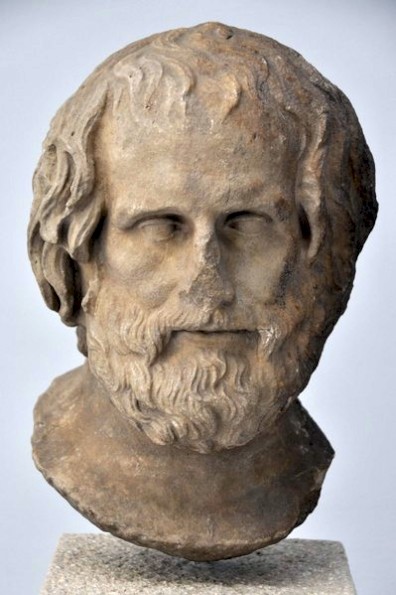Aristophanes Fragment from Gerytades Athenaeus 12.551A (Loeb Aristophanes Fragments 156)
Translated by Steven J. Willett

Note 1: The setting of the play is Athens where an assembly of poets select Meletus to represent tragedy, Sannyrion comedy and Cinesias dithyramb for a trip to Hades where they will meet their deceased predecessors. The reason for the journey is unclear, but the chosen are slim (according to Athenaeus) and riding on slim hopes. They may serve as envoys to praise the dead and hold a celebratory dinner party. The date of the play is 407 or 408 based on references to poets and poetry. Sannyrion is one of the “trygic singers” because ‘trygedy’ (from tryx “wine-lees”) was a term for comedy that Aristophanes introduced in Acharnians.
Note 2: This is my last post to turcopolier.com. As a slender man on slender hopes, I’ve done my best to bring some of our great poetic heritage to your knowledge and appreciation. The occasionally high readership and the perceptive comments show the success of my goal. The mere repetition of more poetic translations will not, I believe, really increase love of Greek, Latin, Italian, German and Russian poetry. Those who love it, always will. Those who enjoy a different mental route to exercise their creativity, will always find it. I wish the best on all of you as I now say sayonara.
Aristophanes Gerytades Fragment Ath. 12.551A
(A) And who to the dead’s abyss and gates of gloom
has dared descend? (B) One from each poetic craft
we chose in common during an assembly meeting,
those we knew as Hades-Swarmers and often
feel that place is home. (A) So there are some
men among you who’re Hades-Swarmers? (B) By Zeus
many indeed. (A) Like Thrace-Swarmers? (B) You got it!
(A) And who then might they be? (B) First Sannyrion
from trygic singers, and from tragic choruses
Meletus, and from dithyrambic songs Cinesias.
(A) How on such slender hopes you’re riding then!
For these men, if strongly it comes cascading,
The river of diarrhoea will carry them far away.

Thank you for a unique journey.
I wish you the best. Hope your ‘sayonara’ is not final.
Professor Willett
I’m very sorry to read of your decision to cease posting at turcopolier.com. We have been extraordinarily privileged to have such a distinguished academic cast his pearls before us.
This final fragment is a fitting choice. I guess it dates from just before Euripides’ death, but the journey into Hades in search of dead poets nevertheless brings to mind The Frogs. From my limited knowledge of this play, it concerns an attempt to bring Euripides back from the dead – so he may rescue Athens from cultural decay. Perhaps Aristophanes set out a similar rationale for the journey in Gerytades. Anyway, your own forays into the underworld have successfully brought great poets back, through wonderful translations.
A cascading river of diarrhoea is a good description of the threat posed to our present culture. Our chances may be slim, but I for one have been inspired. I wish you well in your future endeavors.
Thank you very much for your comments, which have always been superb.
In Frogs Dionysius with an old but very smart slave Xanthias go down to Hades with the goal of bringing the now dead Euripides back to Athens for more of his drama. A contest develops between Aeschylus and Euripides, but a final weighing of verse passages by each playwright gives victory to Aeschylus. Given the date of the play, 405, that was a terribly chaotic time in Athens as it faced defeat in the Peloponessian War next year. Aeschylus was a better choice, but Dionysius didn’t make it, the weighty power of Aeschylus’ verse did. The Aristophanes article in Wikipedia has a wonderful vase painting of Xanthias, my favorite character in the comedy.
Professor Willett,
Thanks for the poems, the commentary and the history lessons. I will miss them.
Ishmael Zechariah
Be well Sir, as far as I am concerned you may well have been casting pearls before swines, like me. One breeding of them … the ones that don’t find mental backdoors out of the present unfolding, relentlessly …
I hope you will return with more. If that’s not an ungrateful way of saying thank you for what you have given already.
Cavafy? You say he’s a pig to translate but who better than one who has lived where he lived?
Professor Willett, I’m very sorry that you will no longer be posting. I learned a great deal from you. I hope you change your mind, but if not, many thanks.
I would have liked to read your translation of this one:
As you set out for Ithaca
hope your road is a long one,
full of adventure, full of discovery.
Laestrygonians, Cyclops,
angry Poseidon—don’t be afraid of them:
you’ll never find things like that on your way
as long as you keep your thoughts raised high,
as long as a rare excitement
stirs your spirit and your body.
Laestrygonians, Cyclops,
wild Poseidon—you won’t encounter them
unless you bring them along inside your soul,
unless your soul sets them up in front of you.